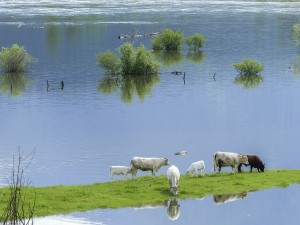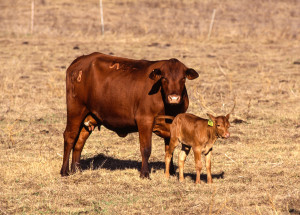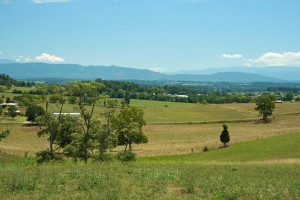Summer is a time when your animals spend most of their time grazing. Summer is also a time when your cattle herd can face health issues. On this blog we will discuss some of the common health issues that your cattle herd might face during summer.
Summer is typically a time for cattle farmers to graze their herd on pastures. It’s also a time when cows and calves may experience health issues. If you are well prepared before health issues become a serious problem for your herd, you could be saving yourself from serious economic losses.
When you have a large farm, it becomes difficult to monitor the health issues of individual animals, so you should keep in mind the types of diseases that might affect the health of your herd during the summer seasons. Below are some common issues that you need to check and make sure that your cattle herd is in good shape.
Weather related health hazards
Summer weather, especially, heat, rain, and storms could become a health hazard for your cattle herd. Dealing with Mother Nature’s wrath could become a challenge if you are not prepared for them. Below are a few of the weather issues that you should be prepared for.
Tornadoes and high winds
Strong winds and tornadoes can destroy structures, pick up debris and drop them in unexpected places. Debris could damage your pasture lands, animal sheds, and pens. After a severe storm, inspect your pastures for any harmful debris. Comb through your grazing areas and look for hazardous objects especially metal objects, nails, wires and such. These could be dangerous for your animals if ingested or stepped on.
Flooding
A flooded pasture is also dangerous for livestock. Stagnant water exposes livestock to infection by parasites, bacterial diseases, such as blackleg a soil-borne bacterium infection, and fungal infections such as hoof rot. Stagnant water is also harmful for your pasture plants, drowning their roots and rotting vegetative growth.
Lightning
Lighting is one of the major causes of farm fires. “Lightning also is responsible for more than 80 percent of all livestock losses due to accidents and millions of dollars in damage to farm buildings and equipment annually, “ says Farm and Ranch Guide. A lone tree in the middle of the pasture may provide shelter for livestock but it is also more likely to get hit by lightning during a thunderstorm resulting in loss or injury of cattle. Lighting damage can be prevented by using proper Lightning Protection systems.
Summer heat
Hot and dry weather in summer could cause heat stress for your cattle herd. High heat, humidity and lack of wind will affect your cattle health in many ways. Make sure you have enough room and air circulation in their holding pens or barns and enough cool water and shade during the day.
Summer diseases
When you are checking your pasture or barns and looking for animal health concerns, look for the following factors concerning your cattle herd health.
Check for flies
Rain can increase the number of flies in your pasture or barn. Flies could be a threat to your animal health, so make sure you get rid of flies if they are becoming a problem.
Summer pneumonia
Summer pneumonia in nursing calves could be a serious issue. With proper management and precautions the risk of summer pneumonia could be avoided.
Here are a couple of ways to reduce summer pneumonia risk in calves
- Calving management: Adequate and immediate intake of colostrum.
- Avoid mixing: Mixing cows and calves is a major factor that spreads diseases in calves.
- Long distance travels to pasture: Avoid stress and traveling long distance during summer.
(Source: Summer Herd Health Part 2: 5 risk factors for summer pneumonia in calves | BEEF Daily)
Pink eye
Pink eye is known to cause serious economic damage to cattle farmers. Pink eye can cause scars and lower weaning weights. Seek advice from your vet or nearby veterinary services.
Anthrax
Anthrax is a fatal disease in cattle. Early detection of anthrax is important for saving lives of your cattle herd. Get help from nearby agricultural services to identify, separate, and treat anthrax infected animals in your herd as soon as possible.
Nutrition
Nutrition in cattle plays a major role in keeping your animals healthy and fighting off diseases naturally. Make sure a balanced meal is given with supplements, especially for the pregnant and lactating animals.
Conclusion
During the summer season, especially if you are experiencing harsh weather, take extra care of your animals health. It’s important that you monitor your animals regularly for health issues. Have your vet visit to inspect your herd regularly. Make sure all regular health protocol is being maintained. Regular vaccination and proper treatment of diseases as well as a proper nutrition plan is needed to keep your animals healthy. You may need to quarantine and take proper preventive measures for sick animals.
Do you have a question or concern about livestock health and welfare? We could help. Click here to book a meeting with us or call us at 303-495-3705.
Have you tried our DIY systems? Click here for DIY plans for proven livestock feeding systems. You can also get your Feed in A Box Microgreens (fodder) from us!
IF you have any question or comments, please leave them in the comment box below or visit our Facebook Page.
Related articles and resources:
- Tips on Cattle Management and Livestock Health | Sustainable Livestock Nutrition
- Cattle Health – Prevention & Control of Cattle Diseases | Sustainable Livestock Nutrition
- Get rid of Cattle Flies Once and For All | Sustainable Livestock Nutrition
- Diseases – The Cattle Site
- 4 Beef Cattle Health Concerns To Think About This Week | Flies, Heat Stress, Anthrax, Pink Eye | BEEF Daily
- Summer storms rain down with livestock health hazards
- Summer Herd Health Part 2: 5 risk factors for summer pneumonia in calves | BEEF Daily
- Lightning Protection
- Manage Water & Feed for Low Stress Livestock Farming | Sustainable Livestock Nutrition
- Basics of Feeding Beef Cattle – Sustainable Livestock Nutrition | Sustainable Livestock Nutrition



